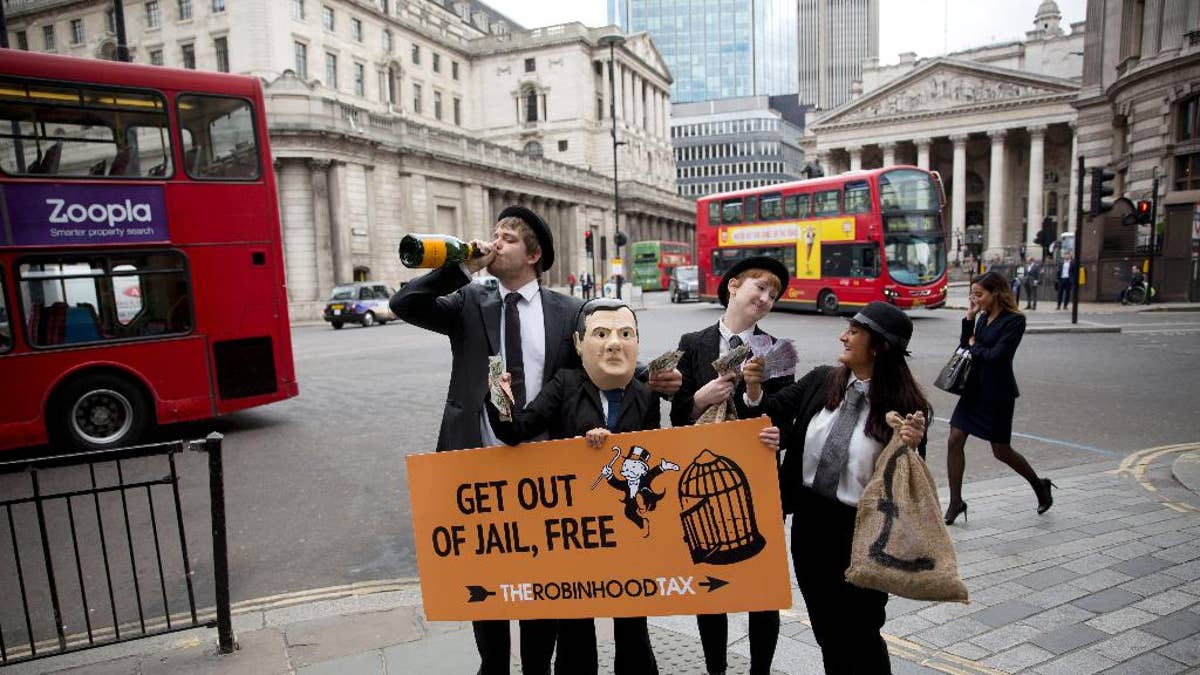
Campaigners from the Robin Hood Tax organization dressed as bankers, including one wearing a mask representing British Chancellor of the Exchequer George Osborne, hold placards as they pose for the media outside Mansion House, backdropped by the Bank of England at left, in London, Wednesday, June 10, 2015. The group say their idea for a Robin Hood Tax is a tiny tax on the financial sector that could generate billions of pounds annually to fight poverty and climate change. The stunt was held by the group to coincide with Osborne's annual economic speech due to be held at Mansion House on Wednesday evening. (AP Photo/Matt Dunham) (The Associated Press)
LONDON – The U.K.'s Treasury chief announced Wednesday that the government will start selling its stake in the Royal Bank of Scotland in coming months, the first step in the country's attempt to recover money from its costliest bank rescue operation ever.
Osborne outlined the plan during his Mansion House speech, an annual event attended by some of Britain's most prominent business leaders. He said the Treasury would sell part of its 80 percent stake in the coming months, even though RBS's shares are trading for less than the government paid for them during the global financial crisis. Selling a small stake now will make it easier and more profitable for the government to sell the rest of its holding in the future, he said.
"It's the right thing to do for British businesses and British taxpayers," Osborne said in prepared remarks. "Yes, we may get a lower price than Labour paid for it. But the longer we wait, the higher the price the whole economy will pay. And when you take the banks in total, we're making sure taxpayers get back billions more than they were forced to put in."
The Treasury injected 45.5 billion pounds ($70.6 billion) into RBS in 2008 and 2009 to keep the bank solvent as the value of risky investments plunged and bad loans soared during the global financial crisis. RBS has paid the government about 4.3 billion pounds in dividends and fees since that investment. The government's stake is currently valued at 32.7 billion pounds.
N M Rothschild & Sons Ltd., which provides financial advice to governments worldwide, says that a partial sale now would boost the stock price, and might ultimately result in a profit. Even if it doesn't, gains on the sale of the government stakes in other banks mean that taxpayers will make a profit on the government's total investment in all the banks.
"The returns on the government's interventions in RBS will be determined by the success of the whole of the selling program, rather than the terms achieved on the first few disposals," Rothschild said. "Accordingly, as a precursor to a long-term program, we believe that it is now in the interest of taxpayers for the government to set in train an initial small disposal of RBS shares."
The Bank of England's Governor Mark Carney also offered support for the sale, saying that public ownership has largely served its purpose by preventing financial contagion at a time when the system was fragile.
"Continued public ownership without a foreseeable end point runs risks including limiting RBS' future strategic options, and continuing the perception that taxpayers bear responsibility for RBS losses." Carney wrote in a letter to Osborne. "In these regards, there could be considerable net costs to taxpayers of further delaying the start of a sale."
Osborne also used his speech to set out the government's priorities with the upcoming talks on whether Britain would remain in the European Union. He said it is in Britain's interests to have a strong, successful euro, the currency used by only 19 of the EU's 28 countries, but not Britain. Osborne said Britain was prepared to support the currency union as it integrates further.
But he said the country wants a settlement that protects the EU-wide single market.
"We need a settlement that recognizes that while the single currency is not for all, the single market and the European Union as a whole must work for all," the excerpts said. "So among the principles we seek to establish in this re-negotiation are these simple ones: fairness between the euro-ins and the euro-outs enshrined, and the integrity of the single market preserved."
